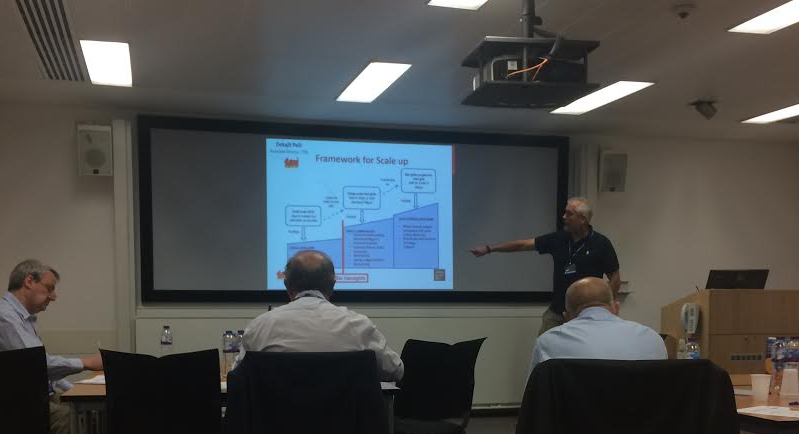
Blog about the workshop on Productive Power Use held in Southampton in early July 2017 by Chetanraj Dhillon and Honor Drummond.
This blog has been written by Chetanraj Dhillon (BSc(hons) Geography with Economics student, Loughborough University) and Honor Drummond (BSc(hons) Geography student, Loughborough University), who represented Loughborough University at the workshop alongside Dr Jonathan Cloke of the LCEDN (shown here giving a presentation at the workshop).
This Productive Power Use workshop was organised by Africa Power and the University of Southampton and held at the University in early July.
The organisations attending the workshop included:
- MeshPower
- Practical Action Consulting
- Loughborough University
- Africa Power
- University of Southampton
- Carbon Trust
- Chilli Children Trust
After an introduction by Prof. AbuBakr Baha from University of Southampton SERG, Alastair Livesey from Africa Power discussed the aims of the workshop. He argued that while it is important to focus on providing power, the specific focus of this workshop was to look at the use of power in Africa; what people want power for and how to incorporate this, for example, into an enterprise. Four presentations were delivered providing case studies of sustainable energy use in this context:
Emma Colenbrander (emma.colenbrander@practicalaction.org.uk) from Practical Action provided an insightful presentation on the base-up approach and how providing better energy opportunities can help target communities to support and expand their livelihoods. A case study about solar mini-grids in Kenya was presented, identifying feed production as a productive use of power. An interesting discussion around the dynamics of base-up approaches, such as community consultations, followed which focused on their ability to accurately encompass community needs and efficiently direct project efforts, particularly when there is asymmetric information.
.png)
Jean Billant from GERES presented information about another case study in rural Africa where solar systems have been introduced into small communities. This included data on cash-flows and models which illustrated progress so far and future prospects. In addition, Jean presented a case for the transferral of ownership of nano-grids from organisational providers to the target communities themselves, providing these communities have the necessary institutions, in order to develop community independence and prevent the leakage of vital cash.

Jon Cloke from the LCEDN delivered a presentation on the solar nano-grid (SONG) project in Kenya and Bangladesh (top photograph). This mainly discussed the value of solar nano-grids and the opportunities that they provide in a community, particularly vulnerable off-grid rural communities. Jon placed particular stress on the need to recognise the complex social dynamics and challenges existing prior to and following the implementation of solar technologies in rural off-grid communities.

MeshPower discussed the development of solar nano-grids in Rwanda. They iterated the importance of providing for communities and not just individuals. They discussed progress so far and their further plans to bring down the costs of nano-grids and further their expertise. There was also interesting discussion surrounding MeshPower’s wall-mounted electricity-control-and-meter unit as a means to improve energy ease-of-access and simplify the electrification process. However, there was some concern among participants that the presently high cost of the unit may price out many poorer households. MeshPower responded with plans to reduce the cost of the unit in the near future.

Following the case study presentations, a Q&A session was held briefly to discuss case studies and approaches, how they worked and how to improve them.
After lunch, brainstorming groups were formed containing representatives from different organisations in order to create, discuss, and exchange ideas on potential micro-business opportunities in Africa. Ideas were categorised by profitability and data availability. This provided potential business ideas to be further investigated.
Key conference take-away points:
- For off-grid communal solar to bring sustainable development to rural off-grid communities, it must be used to power and encourage local enterprise;
- The enterprise encouraged and powered through off-grid solutions must be context-appropriate and focused on developing the social networks and conditions for ‘market catalysing’ and market take-off;
- There is a need for more data on local enterprises, particularly regarding prices, sales, revenues, costs and profitability, in order to inform research and support the development of context-specific business models.
This conference provided opportunities for networking as well as stimulating discussion, sharing ongoing research, addressing gaps in data and establishing common goals across disciplines and organisations. A follow-on conference will be held in 2018 to report new findings and investigate further prospects for energy access in Africa.
